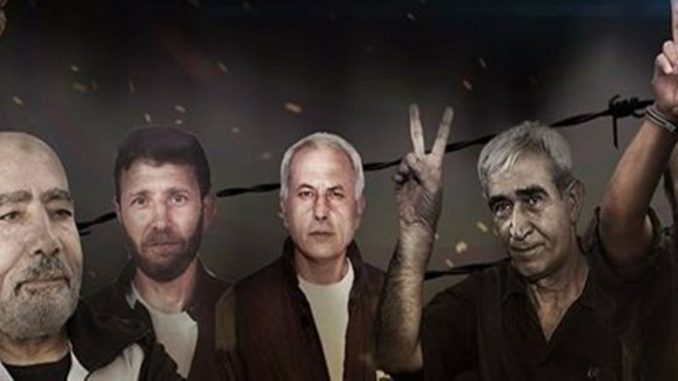
A mass hunger strike underway in Israeli prisons rounded off its third week on Sunday, as Israeli authorities have maintained a severe crackdown on prisoners who are refusing meals, while the medical conditions of numerous hunger strikers continued to decline.
An increasing number of strikers have reportedly experienced loss of balance, muscle atrophy, and heavy fatigue.
Since approximately 1,500 political prisoners launched the open-ended hunger strike on Palestinian Prisoners’ Day, April 17, in demand of basic rights, the Israel Prison Service (IPS) has also imposed a range of repressive measures in an attempt to quash the hunger strike.
Many hunger strikers have notably landed in solitary confinement, and scores of others have been dispersed throughout Israel’s network of prisons. Arbitrary prison transfers are a common IPS tactic aiming to suppress resistance among Palestinian prisoners.
Some prisoners have been transferred four times since the strike began, according to Palestinian prisoners’ solidarity network Samidoun.
The Palestinian Committee of Prisoners’ Affairs reported on Sunday that 30 Palestinian prisoners were transferred from various prisons across Israel to Ashkelon prison in Israel’s southern district.
Among those transferred were Secretary-General of the Popular Front for the Liberation of Palestine (PFLP) Ahmad Saadat, head of Hamas’ prisoners leadership committee Abbas al-Sayyid, prominent former hunger striker and journalist Muhammad al-Qiq, longest-held Palestinian prisoner Nael Barghouthi, and PFLP leader Ahed Abu Ghoulmeh — who all joined the strike on its 18th day on Thursday.
Samidoun also reported that IPS planned to transfer 100 prisoners from Ohalei Kedar prison to Section 10 in Eshel prison on Sunday.
The media committee of the hunger strike meanwhile said that IPS officials in the Ramle prison had refused to send hunger-striking prisoners whose healths had seriously deteriorated to the hospital.
The committee quoted hunger-striking prisoners Ammar Mardi and Ratib Hreibat, whom a PPS lawyer was able to in Ramle for the first time on Sunday, as saying that IPS kept the hunger strikers in “prison cells that lack the simplest conditions for human life.”
The two prisoners told their lawyer that IPS forces stormed their cells every day in an attempt to “exhaust them, provoke them, and coerce them into ending their hunger strike.”
The prisoners added that they had only been allowed to access the prison courtyard three times since the beginning of the strike three weeks ago.
Meanwhile, the Israeli military prosecution accused Palestinian lawyers on Sunday of serving as “communication channels” between imprisoned leaders of the hunger strike to coordinate the mass movement, Hebrew-language news site NRG reported.
In addition to transfers and being placed in solitary confinement, hunger strikers have also faced assault, nightly raids in their cells, confiscation of personal belongings including salt — as hunger strikers have only been consuming salt and water — subhuman cell conditions, and lawyer and family visitation bans.
Meanwhile, Samer Issawi, a representative for hunger strikers affiliated with the Democratic Front for the Liberation of Palestine (DFLP), said he would not take part in negotiations with IPS — though it remained unclear whether or not Israeli authorities had actually attempted to engage him in negotiations.
Nonetheless, Issawi affirmed in a statement conveyed by the DFLP that the only party authorized to conduct the negotiations was the leadership of the hunger strike, most prominently imprisoned Fatah leader Marwan Barghouthi.
Issawi confirmed his commitment to the unity of the hunger strike behind its leadership, while Ibrahim Mansour, the head of the DFLP’s prisoners’ committee affirmed that the prisoners would continue their hunger strike until their demands were achieved.
Issawi had previously announced that DFLP-affiliated prisoners would begin refusing water Sunday if IPS continued to ignore the demands of the mass hunger strike, but it remained unclear as of Sunday afternoon if the DFLP prisoners had begun to do so.
Meanwhile, the European Union heads of mission in Jerusalem and Ramallah said Saturday that it was “following with concern the ongoing hunger strike by Palestinian prisoners in Israeli prisons, held in protest against the conditions of their detention.”
The EU heads of mission called for the full respect of international humanitarian law and human rights obligations towards all prisoners, noting that the detention of Palestinians contravened the Fourth Geneva Convention, which prohibits the transfer of prisoners outside of occupied territory, which can result in family members being denied access to their detained relative.
The statement also reiterated the the EU’s “long-standing concern about the extensive use by Israel of administrative detention without formal charge” — one of the main policies targeted by the ongoing hunger strike. “Detainees have the right to be informed about the charges underlying any detention, must be granted access to legal assistance, and be subject to a fair trial, be given a fair trial within a reasonable time, or be released,” the heads of mission insisted.
The hunger strikers are also denouncing the torture, ill treatment, and medical neglect of Palestinian prisoners at the hands of Israeli authorities.
Alleged footage of Marwan Barghouthi breaking hunger strike fake
A committee supporting the mass Palestinian prisoner hunger strike has denounced footage released Sunday evening by the Israel Prison Service (IPS) purporting to show strike leader Marwan Barghouthi eating in his prison cell, calling the release part of an Israeli “war of lies” to discredit the prisoner movement.
The footage — which did not bear timestamps and did not clearly show the face of the prisoner being filmed — allegedly showed Barghouthi, a Fatah leader and the emblematic figure of the hunger strike, hiding in a bathroom stall to eat sweets, and was shared widely on Israeli media on Sunday.
According to Israeli daily Haaretz, sources from IPS admitted that the organization “set him up in an attempt to see whether Barghouti was really sticking to the hunger strike.”
IPS claimed that the surveillance videos were filmed during the hunger strike, which began on April 17 to demand basic rights and denounce Israel’s use of torture, medical neglect, and administrative detention against Palestinians.
However, the National Committee for the Freedom and Dignity Strike — a joint committee formed by the Palestinian Prisoner’s Society (PPS) and Palestinian Committee for Prisoners’ Affairs — said that the footage dated back to at least 2004.
The committee said IPS’ decision to share the footage and present it as recent was evidence that Israel was “waging a serious war of lies and misleading information to create a state of confusion in the Palestinian public and among hunger striking prisoners.”
Fadwa Barghouthi, a member of the Fatah party’s Revolutionary Council and Barghouthi’s wife, said during a news conference on Sunday evening that the “Israel government’s fabrications” showed “the extent of the (Israeli) occupation’s decline,” adding that it would not affect the resolve of the estimated 1,500 prisoners participating in the strike.
On Sunday, the National Committee to Support Palestinian Prisoners’ Hunger Strike called on the Palestinian Authority to suspend municipal elections scheduled for May 13, and to halt its contested security coordination with Israel, which has been accused of funneling Palestinians into Israeli prisons.
The committee also called on Palestinians to continue showing their support for the hunger strikers, as well as to boycott all Israeli products, to stop working in Israel and in Israeli settlements, and to participate in a commercial strike scheduled for Thursday.
Israeli authorities have detained approximately one million Palestinians since the establishment of the state of Israel in 1948 and the subsequent occupation of the West Bank, East Jerusalem, and the Gaza Strip in 1967, according to Palestinian organizations.
According to prisoners’ rights organization Addameer, some 6,300 Palestinians were held in Israeli custody as of April.



